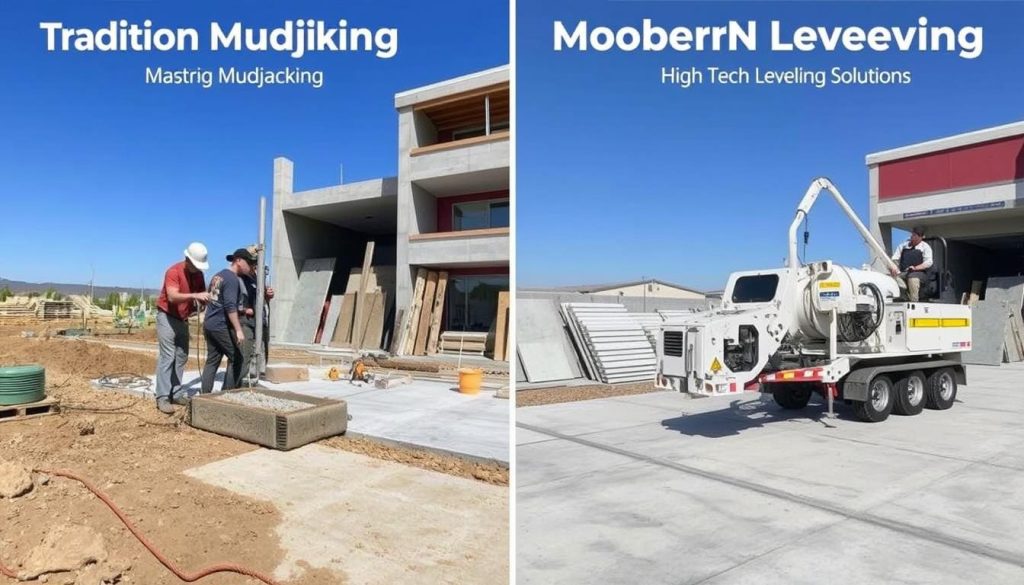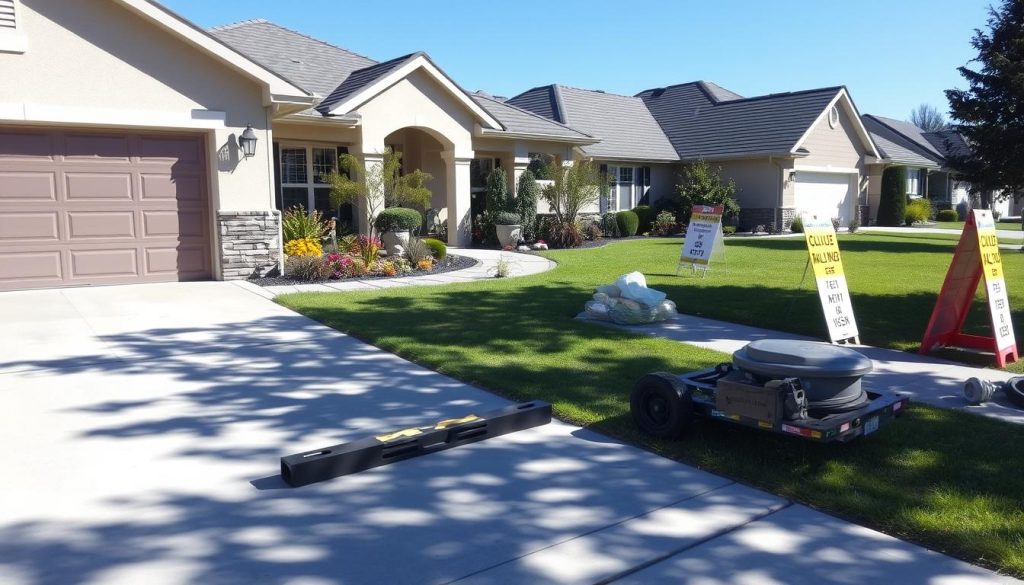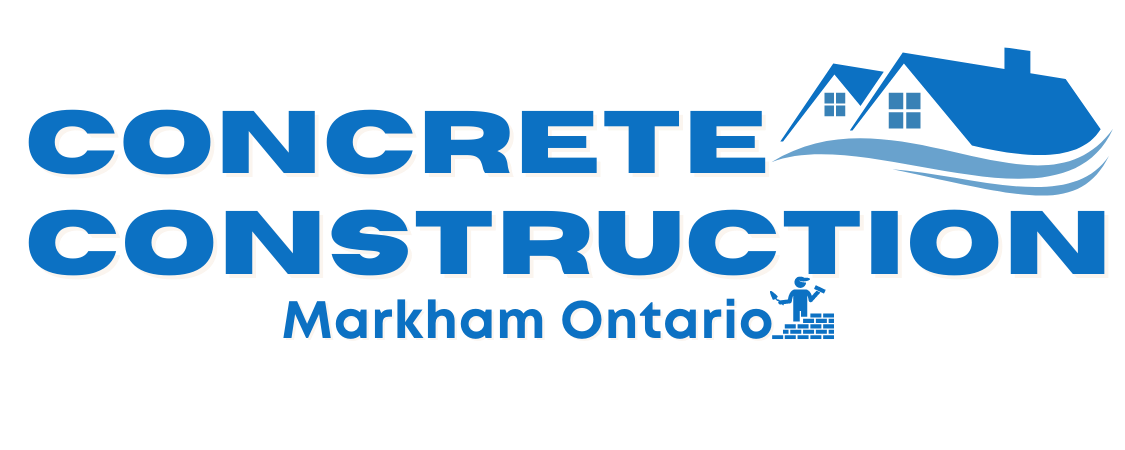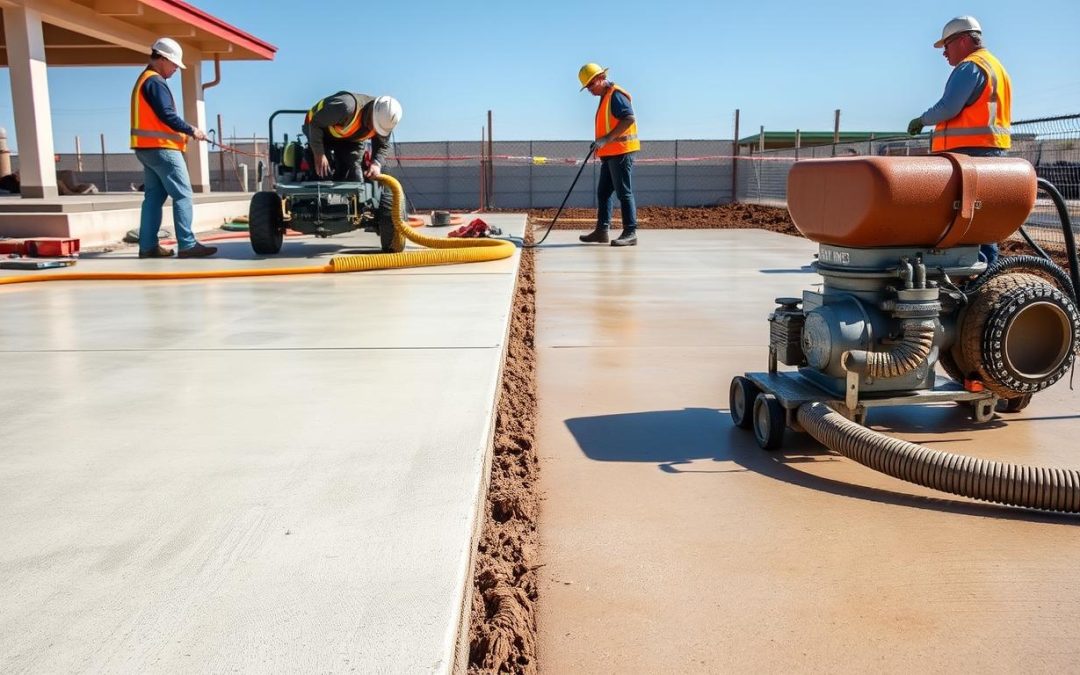Concrete leveling, also known as mudjacking, is a cost-effective way to fix uneven concrete. It can make a property look better and increase its value by leveling floors. It’s great for fixing cracks and uneven surfaces that can be dangerous.
Choosing professional concrete leveling or mudjacking can stop more damage. It keeps your property safe and even. This method is key to keeping your property’s value and integrity up. With it, you can have a level and safe surface.
Key Takeaways
- Concrete leveling, or mudjacking, is a cost-effective solution for repairing uneven concrete surfaces.
- Professional concrete leveling or mudjacking can improve the look and value of a property.
- Common signs of settling concrete include cracks and uneven surfaces, which can pose safety risks.
- Concrete leveling or mudjacking can address safety risks associated with uneven surfaces.
- Investing in professional concrete leveling or mudjacking can prevent further damage and ensure a safe and even surface.
- Concrete leveling is essential for maintaining the integrity and value of a property.
Understanding Uneven Concrete Problems
Uneven concrete can be a big problem for homeowners and property owners. It can cause safety hazards and lower property value. Foundation repair is often needed to fix these issues, which can come from settling concrete. Slabjacking is a common way to fix uneven concrete, but it’s important to know the root cause first.
Signs of settling concrete include cracks, uneven surfaces, and water buildup. These problems can be due to soil type, weather, and poor drainage. Settling concrete can lead to tripping hazards and water damage. In bad cases, it can even harm a building’s structure, making foundation repair a must.
To tackle uneven concrete issues, finding the main cause is key. This might mean checking the soil, looking for drainage problems, and examining the concrete. Knowing the main problem helps property owners find the right fix, like slabjacking or other foundation repairs. Important things to think about include:
- How bad the damage is
- The soil and drainage situation
- The cost and success of different fixes
By tackling uneven concrete problems early, property owners can keep themselves safe and protect their investment. Whether it’s slabjacking or other foundation repairs, fixing settling concrete is vital for a stable and safe property.
What is Concrete Leveling or Mudjacking?
Concrete leveling, also known as mudjacking, fixes uneven concrete surfaces. It uses a special material, like polyurethane, to lift and level the concrete. This method is fast and lasts long, making it a top choice for fixing sidewalks, driveways, and patios.
Concrete lifting is another way to describe this process. It involves drilling holes and injecting a material to lift sunken areas. This is great for fixing uneven concrete caused by soil settlement or erosion. Homeowners can make their uneven concrete surfaces safe and even again with this method.
Some benefits of concrete leveling include:
- Cost-effective compared to replacing the entire concrete surface
- Quick repair time, often completed in a few hours
- Long-term durability, with some materials lasting up to 20 years
Understanding concrete leveling or mudjacking helps homeowners make smart choices. Whether it’s polyurethane concrete leveling or concrete lifting, these methods ensure a safe and even surface for years.
The Science Behind Concrete Settlement
Concrete settlement is a complex process. It involves soil composition, weather, and drainage issues. Knowing these factors helps prevent or fix uneven concrete. When resurfacing concrete, it’s key to look at the soil composition.
Soil type, density, and moisture affect concrete settlement. For example, expansive soils like clay can make concrete shift and settle unevenly. This leads to cracks and damage. But, well-draining soils like sand can help prevent settlement.
Soil Composition Factors
- Soil type: Different soils expand at different rates, affecting concrete settlement.
- Soil density: The soil’s density impacts how much weight the concrete can bear, leading to settlement.
- Moisture content: Too much moisture in the soil can cause concrete to settle unevenly, leading to cracks and damage.
Concrete settlement is a big problem, mainly when resurfacing. By understanding the science behind it, we can prevent or fix uneven concrete. This ensures a safe and level surface for years.
Professional Concrete Leveling Methods
Professional concrete leveling methods are a cost-effective and efficient way to fix uneven concrete. They can repair and restore surfaces damaged by weather, drainage issues, or other factors. Polyurethane foam is a popular choice, injected into the area to lift and stabilize the concrete.
Cement-based materials are also used to fill gaps and cracks. This method is often paired with grinding and polishing to achieve a smooth surface. It’s worth noting that the right method depends on the project’s needs, including the damage type and desired outcome.
Professional concrete leveling offers several benefits:
- Quick and efficient repair process
- Cost-effective compared to replacement
- Addresses various concrete problems, including weather and drainage issues
Choosing a professional method ensures your concrete surfaces are safe, stable, and look great. Whether the issue is weather damage, drainage problems, or something else, a professional solution can help.
Benefits of Polyurethane Concrete Lifting
Polyurethane concrete lifting is a top choice for fixing uneven concrete. It’s fast to cure, perfect for those who need quick fixes. This method uses a lightweight solution that expands to lift the concrete back up.
This technique has many perks. It cures fast, so you can use the area soon. The lightweight solution is great for weak or unstable soil. Plus, it lasts long, keeping your area stable and even for years.
- Minimal disruption to daily activities
- Cost-effective compared to traditional concrete replacement methods
- Environmentally friendly, as it reduces the need for new concrete and waste disposal
Choosing polyurethane concrete lifting means a safe, even, and durable surface. It boosts your property’s value and looks. With its fast cure, lightweight solution, and lasting durability, it’s a smart choice for fixing uneven concrete.
Traditional Mudjacking vs. Modern Solutions
Property owners have two main choices for fixing uneven concrete: traditional mudjacking and modern methods like polyurethane concrete lifting. Traditional mudjacking uses a mix of cement, soil, and water to lift the concrete. It’s been around for years but has big downsides like extra weight and mess.
Modern solutions like polyurethane concrete lifting are better. They use a foam that expands to lift the concrete. This method is faster, cleaner, and less invasive than traditional mudjacking.
Modern solutions have many advantages:
- Faster curing time
- Lighter weight, which reduces the risk of further settlement
- Less mess and disruption
- Long-term durability
While traditional mudjacking works, modern solutions like polyurethane concrete lifting are often better. They offer a quick, efficient, and lasting fix. Choosing the right concrete leveling techniques ensures the job is done well and lasts for years.

Applications for Different Property Types
Concrete leveling is a versatile solution for many property types. It fixes uneven concrete surfaces, boosting their look and value. For homes, it can fix uneven driveways, sidewalks, and patios, making the home look better.
In commercial settings, it’s key for a safe and even surface. This includes fixing floors in stores, restaurants, and offices. For industrial uses, it fixes uneven surfaces in warehouses and factories, keeping the work area safe.
Residential Solutions
At homes, concrete leveling fixes uneven areas like driveways, sidewalks, and patios. It makes the property look better and keeps it safe from accidents.
Commercial Applications
In commercial areas, it fixes flooring, parking lots, and sidewalks. This keeps the area safe for everyone, lowering the chance of accidents.
Industrial Uses
Industrial places need concrete leveling for warehouse floors, factory floors, and other industrial surfaces. It makes the work area safe, prevents accidents, and protects equipment.
Concrete leveling improves safety, looks, and value in residential, commercial, and industrial places. It also lowers the risk of accidents and legal issues.
Cost Factors and ROI Considerations
Homeowners and business owners often worry about the cost of concrete leveling. It’s important to understand the cost factors and ROI to make a good choice. The price can change based on the area size, material type, and job complexity.
A price range analysis can show the best option for your needs. The cost for concrete leveling is usually between $500 and $2,000. Replacing the concrete can cost much more, from $3,000 to $10,000 or more.
Value Comparison with Replacement
Concrete leveling is more cost-effective and quicker than replacement. It also makes your concrete last longer, saving you money on repairs. This means less disruption to your daily life.
Long-Term Financial Benefits
Investing in concrete leveling can save you money in the long run. It increases your property value and cuts down on maintenance costs. A well-kept concrete surface also makes your property safer, reducing accident risks.
Concrete leveling is a smart choice for fixing and keeping your concrete surfaces in good shape. By looking at the price range analysis and ROI considerations, you can invest wisely. This choice will bring long-term benefits and value.
Preparing Your Property for Leveling Services
Getting your property ready for leveling services involves a few important steps. First, clear the area around the uneven concrete. Remove any furniture, plants, or other obstacles that could get in the way. This lets the contractors work freely on the uneven spots.
Think about how to keep your floors looking good after they’re leveled. Regular cleaning and checks can stop damage before it starts. These simple steps will help your floors last longer.
Here are more tips for preparing property for leveling services:
- Notify your neighbors of the upcoming work to avoid any disruptions
- Remove any sensitive equipment or electronics from the area
- Keep pets and children away from the work zone
By following these steps and tips, you’ll have a smooth leveling services experience. Remember, preparing your property well can also boost your property’s value and safety.

Maintenance Tips After Concrete Leveling
To keep your floors looking great, follow some simple tips. Taking care of your floors now can prevent future problems. This way, your floors will stay safe and stable.
Preventive Measures
Preventive steps are key to keeping your floors in top shape. Seal your floors to protect them from stains and damage. Use area rugs and mats to reduce wear and tear. Regular cleaning is also important to prevent dirt and debris from causing damage.
Regular Inspection Guidelines
Regular checks are vital to spot issues early. Look for cracks, unevenness, and water damage. Catching these problems early helps prevent further damage.
When to Seek Professional Help
If you see big issues like cracks, unevenness, or water damage, get professional help. A pro can assess the problem and fix it. This ensures your floors stay safe and stable.
By following these tips, you can enjoy your leveled floors for years. Always check your floors regularly and get help if you notice any problems.
- Seal your floors to protect them from stains and damage
- Use area rugs and mats to reduce wear and tear
- Regularly clean your floors to prevent dirt and debris from accumulating
Choosing the Right Concrete Leveling Professional
Finding the right professional for concrete leveling is key for a good project. A skilled contractor can save you time and money. To find the right one, you need to research and ask the right questions.
A qualification checklist is a good starting point. Look for experience, licenses, and certifications. Also, ask questions to ask contractors about their methods, materials, and prices. Some questions include: What leveling method do you use? What materials do you use? Can you show references from past clients?
Qualification Checklist
- Experience with concrete leveling projects
- Licenses and certifications
- Insurance and bonding
- References from previous clients
Questions to Ask Contractors
Asking the right questions helps you find a qualified contractor. Some questions are: What experience do you have with concrete leveling? Can you give a detailed cost and timeline estimate? What kind of warranty or guarantee do you offer?
Red Flags to Watch For
When choosing the right contractor, watch for red flags. These include: no physical address, no licenses or certifications, and no references. By researching and asking the right questions, you can find a qualified contractor for a successful project.
Conclusion
Uneven concrete can be a big safety risk and lower your property’s value. But, there’s good news. Professional concrete leveling or mudjacking can fix these problems. This makes your surfaces smooth and even again.
Working with skilled concrete leveling experts can make your floors and walkways look and work better. This is true for homes, businesses, or industrial sites. You’ll see better safety, higher property value, and peace of mind for your investment.
Don’t let uneven concrete problems stay. Start making your property level, safe, and attractive by contacting a trusted concrete leveling contractor. Your place deserves the best, and with the right help, you can make it even better.

